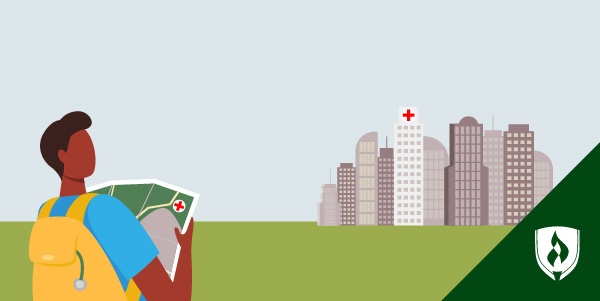What Is an Accelerated BSN? Your Fast Track to an Advanced Nursing Education
By Callie Malvik on 04/15/2019

If you have a passion for helping people and are seeking a career with flexibility, above-average earning potential and the overall satisfaction of improving lives, a career in nursing seems right up your alley.1 You know what a registered nurse (RN) does and the benefits of becoming an RN—you just don’t know which educational route to take.
Should you pick a lower-credentialed nurse program, such as a Practical Nursing or an Associate’s degree program to get your foot in the door quickly? Or should you take a leap and aim for an accelerated Bachelor of Science in Nursing (BSN) program right away?
Accelerate your path toward a fulfilling career with your BSN degree.
Learn More About Our BSN ProgramWe spoke with Dr. Joan Rich, Vice President of the Rasmussen University School of Nursing, to get her expertise on this exciting entry option into nursing. See what she reveals about the accelerated BSN programs at Rasmussen University, and find out whether it’s the right path for you!
Get Your Nursing School Questions Answered at a Nursing Information Session
What is an accelerated BSN program?
Before we get too far ahead of ourselves, it’s important to know what an accelerated BSN program is and how it differentiates from other nursing degree options. We turned to Dr. Rich to provide a detailed explanation of what an accelerated BSN program is and how it’s different than other options.
Simply put, an accelerated BSN program is a fast track to earning a Bachelor’s degree in Nursing. Unlike Practical Nursing Diploma programs or Associate’s degree in Nursing (ADN) programs, completing an accelerated BSN program yields a Bachelor’s degree in Nursing. Graduates of this program can become an RN upon passing the NCLEX exam and meeting all other state licensure requirements.
While an RN to BSN program is designed for already licensed nurses going back to school to further their degrees, the accelerated BSN program is a pre-licensure program, which means it is geared toward students who do not yet have registered nursing (RN) license. This is a degree program for students who want to reach BSN status upon entering the nursing field. If they already possess a Bachelor’s degree in an unrelated field, the accelerated BSN program will enable them to quickly earn their BSN and change career paths.
Dr. Rich explains that an accelerated BSN program is one that typically requires a student to take more credits per quarter than a “traditional” program. This type of program goes year-round and also may require a student to achieve a higher test score for entrance into the program. She stresses that those considering an accelerated BSN program should understand the workload of the program, which requires a limited outside employment workload in order to allow concentration on the nursing curriculum.
The bottom line is that an accelerated BSN program is for the seriously devoted and ambitious nursing student who knows what they want and is willing to put in the effort to get there quickly.
What can you expect from an accelerated BSN program?
Prior to beginning an accelerated BSN program, you must first take the TEAS test. This is a pre-admittance exam that gauges your potential for the nursing program.
Once admitted to this full-time, high-intensity program, you can expect to take a variety of rigorous courses, including didactic courses, labs, simulation and clinicals that provide valuable hands-on experience, Rich explains.
After the program has been completed, you must take the NCLEX-RN exam. With a passing score and all other requirements met, you will become an RN and be on your way to an amazing and fulfilling career.
Because of the intensity and the sheer number of credits a nursing student needs to obtain, it’s not feasible to work full-time while enrolled in an accelerated BSN program. You’ll need to be monetarily secure enough to back away from work for those few years. It’s also important to have family support and a good academic profile in order to get the most out of the program.
“It’s not for everybody,” Rich warns.
Who is an ideal candidate for an accelerated BSN program?
Dr. Rich describes two profiles of students that are a good fit for an accelerated BSN program.
The first student is driven and focused. This person knows they want to be a nurse and are determined to put forth the necessary time and effort to achieve that goal. They know this is the career for them and are willing to devote the next few years of their lives to making this happen.
The second student already has a degree and a job, but is looking to change careers. They aren’t happy with their particular profession and want to pursue one they can be passionate about. Because of their prior college experience, their time to completion would be shorter than someone entering with no degree.2
No matter the case, successful students in accelerated BSN programs need to exhibit great self-discipline. Dr. Rich admits the curriculum is challenging, meaning you’ll need to be organized and motivated to be successful. You should also possess the ability to collaborate with others and take direction well.
If you fit one of the profiles above and consider yourself highly motivated, you should thrive in an accelerated BSN program, according to Dr. Rich.
How long is an accelerated BSN program?
For students coming in with no prior college experience, many accelerated BSN programs are completed in four years, though some can be completed in as few as 33 months.2 For career-changing students entering an accelerated BSN program with a Bachelor’s degree under their belts, a BSN can be earned in as few as 18 months.2
Both options at Rasmussen University provide a relatively quick pathway to earning a BSN—and both can potentially offer time savings if you’re thinking of advancing your education to a Master of Science in Nursing (MSN) as well. With the accelerated Master’s pathway offering, qualified BSN students have the opportunity to complete up to two MSN courses that would satisfy both BSN and MSN requirements. This provides a low-risk way to explore graduate-level coursework and, if you choose to continue on, complete your MSN degree in as few as 15 months, while saving up to $2,050.3
What are some benefits of choosing the accelerated BSN route?
If you’re curious about the advantages of earning a BSN off the bat, look no further. Here are a few things to consider.
More opportunities
Why would someone choose an accelerated BSN program over other nursing options, like an ADN? After all, Associate’s degree holders can be RNs also.
When choosing between an ADN or a BSN, know that the two degrees will impact your career differently. While your title of RN remains the same with the two degree options, a BSN will afford you more career options throughout your nursing career, according to Dr. Rich.
A BSN will allow you to have more options to pursue leadership and management positions compared to an ADN graduate. You’ll also be qualified for more RN job postings, because some hospitals have strict standards and require BSN credentials.
A BSN curriculum will also cover advanced topics, such as public health, emerging technology and informatics, and added responsibilities in leadership. “Many community positions require a BSN degree in many states, such as a public health nurse or licensed school nurse,” Dr. Rich says. Additionally, many advanced nursing specialties require a BSN.
Ahead of the mandate
Another big perk of the BSN is that you’ll be ahead of the game with the upcoming nursing mandate. While some states have set ratio standards for hiring nurses with a BSN, the Institute of Medicine recommends that 80 percent of nurses obtain their BSN by 2020.4 Other initiatives, such as BSN in Ten, propose that nurses obtain their BSN within 10 years of beginning their practice.
Either way, the current movement in the healthcare industry seems to forecast increased education standards for nurses in the future. Earning your BSN now can help you stand out from the crowd from the get-go.
Take the next step
Nursing is the career for you—there’s no denying that. You’re up for the challenge, and you’ll do what you need to be the best nurse you can be. So what are you waiting for?
If you still think you have what it takes for an accelerated BSN program, learn more about the Rasmussen University accelerated BSN programs, and start turning your daydream into the career of your dreams.
Related Articles:
- What Is Forensic Nursing? Investigating the Crossover of Law and Medicine
- 7 BSN Courses to Expect During Your Nursing Education Journey
- I Want to Be a Nurse, but I Didn’t Major in Nursing
- What Is a Public Health Nurse? Exploring This Impactful Nursing Specialty
- Types of Hospitals: Your Go-to Guide for Deciphering the Differences
- MN Nursing: 4 Reasons Why It's Great to Be an RN in Minnesota
- What Degree Do You Need to Be a Nurse? Laying Out Your Options
- Inpatient vs. Outpatient Care: What Nurses Need to Know
1Bureau of Labor Statistics, U.S. Department of Labor, Occupational Outlook Handbook, [information accessed April 2021] www.bls.gov/ooh/. Information represents national, averaged data for the occupations listed and includes workers at all levels of education and experience. Employment conditions in your area may vary.
2Completion time is dependent on credit transfers accepted and courses completed each term.
3Number of eligible courses varies by program and ranges from one to two courses. Time and cost savings are dependent on the eligible student enrolling and completing both the Bachelor’s and Master’s degrees at Rasmussen University through the accelerated Master’s pathway. MSN completion time is dependent on the number of courses completed each term. Please speak to an admissions advisor for details.
4Institute of Medicine of the National Academies, The Future of Nursing: Focus on Education, [accessed April 2021] https://iom.nationalacademies.org/Reports/2010/The-Future-of-Nursing-Leading-Change-Advancing-Health/Report-Brief-Education.aspx
EDITOR’S NOTE: This article was originally published in 2015. It has since been updated to include information relevant to 2021.


.png)

